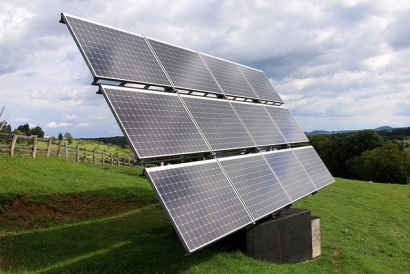
Unfortunately, the development of solar projects sparks opposition among people around the world. In England, plans for a 310- acre solar farm in fields above Alfreton towards Oakerthorpe in Derbyshire are underway. If approved, this large site would generate about 49.9 megawatts of electricity each year, enough to power 11,500 homes. This development project includes a variety of biodiversity and landscaping enhancements that will maintain the state of the land. The plans include retaining grazing sheep on the land, growing hay, keeping honeybees, installing bird boxes and planting trees surrounding the solar panels. Construction is anticipated to commence next year and begin operations in 2022. The site hopes to remain in operation until 2055 and then be dismantled to return to agricultural land to prevent harm to the environment.
Despite these plans to maintain the natural habitats and agricultural land, many residents submitted objection letters to the town in opposition of this solar project. One of the leading complaints involves the elimination of recreation land. Many Derbyshire residents state the solar project will take away the enjoyment and beauty of the countryside. Additionally, due to the COVID-19 pandemic, it is recommended people socially distance themselves and exercise outdoors, but locals believe this project will eliminate open land in the area. Others suspect this project will harm the animals and plants that thrive on the land.
In Melbourne, Australia, a proposal to construct a solar farm is experiencing similar opposition within the local community. Construction of the 68,000 solar panel farm in Springvale South is planned to produce clean energy and create dozens of jobs. However, locals were “promised” the site would be used for parkland thus complaints have been made against the project. Locals state there has been a lack of community engagement and worry recreational land will be limited. Comparable to the solar project in England, “after use” of the site is discussed in the proposal, but the people of Spring Vale South are concerned the land will never be safe for leisure activities.
The Fraser Solar Farm proposed in Victoria experiences the same concerns, including the concern of noise, bushfires, loss of agricultural land and impact on local traffic. The lack of government transparency and communication with local citizens has caused controversy around the development of both Australian solar projects.
As the need for renewable energy increases internationally, similar complaints have been made involving the development of industrial wind farms. People in opposition of wind farms state they are a disruption to society and our environment. The French Academy of Medicine declares wind farms a health nuisance caused by the continuous piercing sound of the turbine. The noise is said to cause loss of sleep, irritability and headaches. Similar worries are seen in Australia and New Zealand, currently adverse health effects must be documented in all industrial wind turbine projects. In Germany, anti-wind industry groups launched litigation against developers and government officials to prevent the development of wind farms.
Transitioning to a world running on solar and wind energy has many benefits on the state of our environment, yet many oppose local projects. The complaints made internationally must be addressed and education must be provided to ensure citizens know the benefits of renewable energy. Building public support for solar and wind to achieve a timely project completion is critical.
Al Maiorino started Public Strategy Group, Inc. in 1995. His firm has developed and managed multiple corporate public affairs campaigns in a variety of industries such as gaming, cable television, retail development, auto racing, renewable energy and residential projects. Additionally, his firm has worked on projects in twenty-seven states and three countries.

